Dentures – Bergenfield, NJ
Get New Teeth to Look Years Younger
If you’re missing any teeth, you know the situation is a challenging one. It keeps you from eating, speaking, and even grinning like you normally would. That said, you could always solve the problem with dentures here in Bergenfield! Those offered by Washington Dental Associates can restore your smile to its former self. To learn more about how they work, keep reading or contact our office for a first-time consultation .

Why Choose Washington Dental Associates for Dentures?
- #1 Implant-Retained Dentures Available
- #2 Money-Back Guarantee
- #3 Decades of Trusted Clinical Expertise
Who’s a Good Candidate for Dentures?
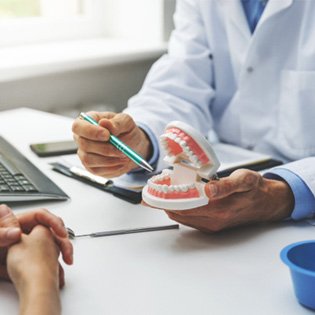
Whether you are missing several teeth or all of your teeth, you likely make a good candidate for dentures. To find out for sure, schedule a consultation with us. If you don’t currently make a good candidate, you aren’t out of luck. By restoring the health of your gum tissue and bone structure, you may be able to become one in the future.
Effects of Missing Teeth
Teeth may be strong, but they can still become damaged in a variety of different ways. The most common causes of missing teeth include tooth decay, gum disease, and injury. According to the American Academy of Periodontology, there are many negative side effects of missing teeth, like facial sagging, difficulty speaking, trouble eating, and lower self-esteem. By replacing your missing teeth with dentures, you can improve all of these areas of your life.
What Qualifies You for Dentures?
Dentures are ideal for patients who have experienced significant tooth loss but have sufficient healthy gum tissue and jawbone. Those who receive dentures must also be committed to their dental health routine and willing to properly care for their new smile.
The number of teeth you are missing and where they are located in the mouth will ultimately determine which type of denture is best for you. Another great thing about dentures is the fact they are more affordable than other tooth replacement options, making them ideal for patients who are unable to invest lots of money into their smile at this time.
Alternative Tooth-Replacement Options
If you aren’t a good candidate for dentures or they don’t sound like your cup of tea, here are some other tooth replacement methods that you may want to explore:
- Dental Bridges: Dental bridges work by “bridging” the empty space in your smile with a replacement tooth. They are ideal for patients who are only missing one or a few teeth. They require healthy teeth surrounding the missing tooth/teeth to support the bridge.
- Dental Implants: A dental implant is a titanium post that is surgically inserted into the jawbone, so they require that patients have a solid bone structure. This option is more costly than traditional dentures, but it’s permanent.
Types of Dentures
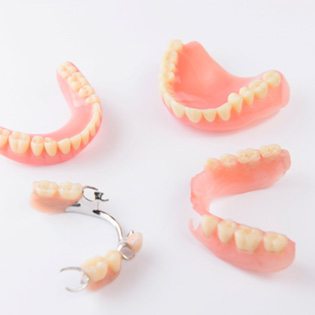
As you start the denture process, you’ll consult with our dentists to better understand treatment. In particular, our office will learn your smile goals, medical history, etc. That way, we can discern the type of denture that best suits you. We’ll typically recommend one of the following:
Partial Dentures
Per their name, partial dentures only replace a few teeth in your mouth’s upper or lower portion. As such, they rely on your natural pearly whites for support. Their bases are also made of plastic (resin) or metal.
Being removable, partial dentures aren’t intended for around-the-clock wear. It’s best to remove, clean, and store them overnight.
Full Dentures
Full dentures are those that replace an entire arch of teeth. Consequently, they don’t use clasps but stay in place with natural suction. To ensure they feel comfortable, dentists will customize each one’s base to fit snugly over your gums.
Implant Dentures
Rather than adjacent teeth, implant dentures stay secure with dental implants — restorations that fuse with your jawbone. They’re thus more stable than traditional kinds, such that they don’t slip or fall out of your mouth. Plus, they stimulate and maintain bone tissue in your jaw. Given such traits, these dentures are a great alternative for patients unhappy with traditional models.
The Benefits of Dentures

Have you gone any amount of time without a full set of teeth? You may already know the various ways you can struggle. On the other hand, replacing your lost teeth can revitalize your smile. Here at Washington Dental Associates, our dentures will grant you many perks, ranging from purely cosmetic to better oral function overall.
Psychological Benefits
Never underestimate the power of a smile when it comes to your mental health. When someone loses teeth, it can damage their perception of themselves. At Washington Dental Associates, dentures are customized to suit each patient’s unique oral needs. That means the results look natural and lifelike. As a result, you can develop a stronger sense of self-confidence and self-esteem, which can help you feel happier and healthier.
Clearer Enunciation
To create certain sounds, you need teeth, plain and simple. Without teeth, communicating and pronouncing become significantly more difficult. Prosthetic dentures allow you to form sounds clearly; however, you may have to adjust how you talk when you first get new dentures. Over time, you’ll get the gist of talking and be able to speak as you used to.
Improves Nutrition
Whether you want to have hard foods like chips or nuts or you crave chewy foods, teeth are essential for eating most foods. Softer alternatives like mashed potatoes and applesauce are somewhat limited, which means you could struggle to get the nutrients your body needs to function at its best. With dentures’ prosthetic teeth, eating tough foods is less tricky. That change, in turn, helps you eat a more well-rounded diet!
Preserves Oral Health
Lost teeth leave the jawbone without stimulation, and the body diverts nutrients to other areas of the body. Over time, the jawbone loses strength and density. Many dentures help to prevent complete facial collapse. Implant dentures, especially, stop the bone loss that contributes to it. That’s why we encourage our denture patients to consider attaching their dentures to root-like implants.
Expands Opportunities
Your smile is one of the first things others pay attention to when they look at you. If you have some missing teeth or no teeth at all, people could make certain judgments about you or be less likely to give you opportunities. On the other hand, if you restore your smile with dentures, social and professional growth is more possible.
In addition to opening doors, dentures can also be a smart long-term choice. If you care for it well, a denture can last 5 to 7 years. Implant dentures typically go for multiple decades! You can thus count on these prosthetics to be an excellent dental investment.
How Dentures are Made

Whether you have a mouth full of teeth or none at all, each mouth is unique and requires a personalized denture to fit comfortably. As a result, we make sure each person receives the care and attention necessary to get the perfect denture for their smile. When creating your treatment plan, we can explain the process moving forward and answer any questions you may have.
What are Dentures Made Of?
A denture usually comprises two or three materials. The gum-colored base typically consists of acrylic, and the dentition or teeth are made of resin or even porcelain in some cases. The other potential material occurs in some partial dentures as the metal clasps that hold onto natural teeth for stability.
Depending on the type of denture you need and the teeth that are being substituted, we will determine the appropriate materials that will give you a natural appearance and a stronger bite.
The Denture Creation Process
To make your dentures, we start by taking impressions of your lower and upper arches. Thankfully, we have the technology to gather data without goopy, messy impressions. A small device digitally scans your mouth within just a few minutes.
We send these measurements and other data to our dental lab, where they create a plaster model of your mouth. Technicians then apply sculpting wax to the model and shape it to replicate your gum tissue and put the dentition in. Once they’ve completed the sculpting work, they create another plaster mold around the entire thing and subject it to heat, which melts the wax. Then, gum-colored acrylic is poured into the mold and hardened. After making the dentures smooth and polished, the lab sends it back to our practice.
The first time you wear your new denture, it is just for a fitting to see if adjustments need to be made. The denture will likely be shipped back for changes, and then returned for your final fitting. If it feels secure and mostly comfortable, you’ll leave with a brand-new smile and renewed confidence!
Adjusting to Your New Dentures
After you’ve left our office, don’t be too surprised if it takes time to get used to having your denture in place. Your gums may even feel slightly uncomfortable or a little sore for the first week or two. Start slow and begin with eating softer and easier-to-chew foods before building back up to a more normal. Practice talking with your dentures in—the more you do it, the faster you’ll adjust.
If your dentures cause you pain, contact us. We can handle small adjustments in the office, and there’s no reason that your dentures should ever be that uncomfortable. We want you to be happy with your smile.
Understanding the Cost of Dentures

The cost of dentures in Bergenfield is manageable for most patients. The exact price depends on a number of factors, so we cannot provide any estimates until you come in for your consultation. Our team will do all we can to help you afford your care. For example, we can assist you with filing insurance claims. Additionally, financing is available for most patients.
Factors That Affect the Cost of Dentures
A few factors that affect the cost of dentures include:
- Preparatory Treatments – Some patients require tooth extractions, gum disease therapy, or other treatments before they’re eligible for dentures.
- Denture Material – Acrylic is used for a denture’s base, while its teeth are made from acrylic or porcelain. These materials can be of varying qualities. That said, more lifelike, higher-quality dentures have a higher price. (However, these kinds are still worth the investment.)
- Denture Type – Dentures come in three types – full, partial, and implant – with different price points. Some patients even choose to pay for two prosthetics. (The first is an immediate set of teeth to wear after an extraction, while the second is a permanent appliance lasting several years.)
Are Implant Dentures More Expensive?
Yes, implant dentures in Bergenfield tend to cost much more than their traditional counterparts. The difference in price is due to the fact that the implant dentures process requires more time, a higher level of skill, more materials, and more complex treatments than traditional prosthetics. The increase in price is well worth it for most patients due to the superior stability and functionality of implant dentures. Plus, keep in mind that traditional dentures tend to last just 5 – 7 years, whereas implant-supported ones have a much longer life expectancy. They are therefore an excellent monetary value.
Does Dental Insurance Cover Dentures?
In most cases, yes – dental insurance is willing to pay for a portion of the cost of dentures. Usually, dentures are classified as a “major service,” meaning that 40 – 50% of their price may be covered by insurance, up to the amount of a policy’s annual maximum. Our team are experts at verifying benefits, filing claims, and finding answers to our patients’ insurance questions. We accept payment from almost all plans.
Other Options for Making Dentures Affordable
As your denture dentist in Bergenfield, we want you to be able to afford your new set of teeth. To that end, we offer a few convenient provisions:
- Flexible Financing – Our office works with CareCredit, a third-party financier that offers low-interest payment plans for dental services. The application process is quick and, if approved, allows you to choose from several different financing options.
- Smile Savings Club – If you become a member of our in-house savings plan, you’ll receive (among other things) 20% off restorative services like dentures.
- Special Offers – Currently, our practice is running a special on dental implants. You can receive implant treatment for as low as $199/month.
Dentures Aftercare

Dentures can transform the appearance and function of your smile! However, even if you don’t have any natural teeth remaining, you shouldn’t stop seeing your dentist. You should still attend regular cleanings and checkups for numerous different reasons. Your dentist will continue to monitor any existing teeth and gum tissue. They will also keep an eye out for abnormalities that could indicate oral cancer. When you have dentures, it is very difficult to notice this kind of thing on your own. Early detection from your dentist is key to making a full recovery.
Removeable Dentures
Remove After Eating
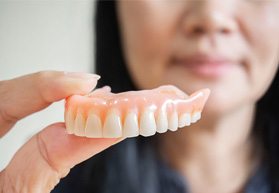
After eating, you should remove and rinse your dentures. This helps to prevent the buildup of food debris and plaque. You shouldn’t use hot water while rinsing. High temperatures can warp the denture material and cause it not to fit properly.
Clean Your Restoration
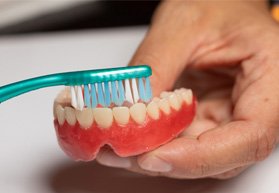
When it’s time to clean your dentures, remove them from your mouth. Using a soft-bristled toothbrush and a small amount of unscented hand soap, mild dish soap, or denture cleanser, gently brush your dentures. You shouldn’t use regular toothpaste, as dentures aren’t made to stand up to abrasive materials. If you aren’t going to be using your dentures again right away, put them in a container of water or denture-cleansing solution so they don’t dry out. Remember to always thoroughly rinse your dentures before placing them back into your mouth.
Keep Your Dentures Safe
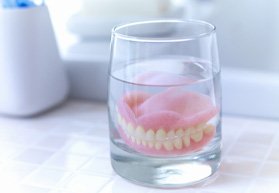
When you clean your dentures, put a towel beneath you just in case you accidentally drop them. This will reduce the probability of your dentures becoming damaged. Remember to keep your restoration out of reach of small children and pets.
Remove When You Sleep

When it’s time to sleep, it’s best to take your dentures out first. Wearing dentures restricts the circulation in your gums, leading to soft-tissue irritation. Sleeping with dentures has also been associated with higher levels of gum and tongue plaque. Overnight, keep your dentures in a denture-soaking solution. Allowing your dentures to dry out can cause them to permanently lose their shape.
Notice Changes

Always be on the lookout for changes so you can address them with your dentist. This includes mouth sores, gum irritation, and signs of infection. If your dentures become damaged, you shouldn’t attempt to repair them on your own. You could accidentally damage them further. Instead, give us a call so we can help.
All-on-4 Dental Implants

If you have all-on-4 dental implants, this process looks a little bit different. You should brush your dentures twice a day using a soft-bristled, manual, or electric toothbrush and nonabrasive toothpaste. Floss your replacement teeth daily – you can find floss threaders to help you floss beneath your denture. You may want to consider investing in a water flosser. For extra freshness, use an antibacterial mouthwash every day.
Denture FAQs
Should I Have All My Teeth Pulled to Get Dentures?
Priority number one is always to save your natural teeth. However, there are some cases where that simply isn’t possible, like when the tooth in question has sustained extensive decay. When it isn’t feasible to save it, then a tooth extraction is necessary. Don’t worry – our Bergenfield dentist will review all of your treatment options at your initial consultation so you can decide together what’s best for your oral health
Can I Sleep with My Dentures?
While you can sleep with your dentures, many dental professionals advise against it. To start, taking them out as you doze gives your gums a chance to rest, preventing soft tissue irritation. Secondly, wearing your dentures for too long can have a negative impact on your oral health, like higher levels of gum and tongue plaque. Lastly, removing them at night is the perfect opportunity to give your dentures a thorough cleaning. All you have to do is place them in a glass of a dentist-approved cleaner. By morning, they’ll be fresh and clean!
Is It Hard to Talk with Dentures?
Fortunately, dentures in Bergenfield aren’t difficult to talk with, especially after you get through the initial adjustment period. While you might experience a slight lisp in the beginning, you may be surprised just how quickly you adapt. After all, each denture is custom-made, ensuring it doesn’t feel bulky or awkward in any way. (NOTE: If you find that your dentures are slipping out of place as you speak, try biting down and swallowing first. This will ensure the restoration is in the right position and that no excess saliva muddles your speech).
What Can’t You Eat with Dentures?
Fortunately, dentures can improve your bite exponentially, especially if you’ve been struggling with moderate to severe tooth loss. With that being said, there are a few foods that you shouldn’t eat with dentures. Sticky foods, like peanut butter and gummy candies, can tug on them, causing them to fall out of position. Hard items that require extensive chewing, such as nuts and certain breads, should also be avoided. Lastly, tough meats, like steak, should be enjoyed in moderation. When you do indulge, make sure to cut it into small pieces to put less stress on you and your dentures.
Can You Kiss with Dentures?
Yes! It’s absolutely possible to kiss with dentures. Just be sure to be gentle at first and stick to closed-lip kisses. That way, you avoid accidentally knocking your restoration against their teeth. For added stability, try adding a little bit of a dentist-recommended adhesive to your dentures beforehand. This will prevent them from shifting.
I Need a Checkup & Cleaning I Have a Broken or Chipped Tooth I am Missing One or More Teeth I am in Pain or Had an Accident I Want to Improve My Smile I Want a Straighter Smile I am Looking for a Dentist for My Child I am Afraid and Afraid I am Worried About Bad Breath & Bleeding Gums I Have Migraines, Headaches or Jaw Pain View Our Services

